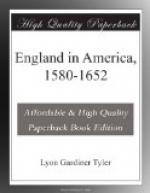Tobacco legislation for the next ten years consisted in regulations vainly intended to prevent further declines. Tobacco fluctuated in value from one penny to sixpence, and, as it was the general currency, this uncertainty caused much trouble. Some idea of the general dependency upon tobacco may be had from a statute in 1640, which, after providing for the destruction of all the bad tobacco and half the good, estimated the remainder actually placed upon the market by a population of eight thousand at one million five hundred thousand pounds.[12]
The decline in the price of tobacco had the effect of turning the attention of the planters to other industries, especially the supply of corn to the large emigration from England to Massachusetts. In 1631 a ship-load of corn from Virginia was sold at Salem, in Massachusetts, for ten shillings the bushel.[13] In 1634 at least ten thousand bushels were taken to Massachusetts, besides “good quantities of beeves, goats, and hogs";[14] and Harvey declared that Virginia had become “the granary of all his majesty’s northern colonies,"[15] Yet from an imported pestilence, the year 1636 was so replete with misery that Samuel Maverick, of Massachusetts, who visited the colony, reported that eighteen hundred persons died, and corn sold at twenty shillings per bushel.[16]
Sir Francis Wyatt arrived in the colony, November, 1639, and immediately called Harvey to account for his abuse of power. The decree against Panton was repealed, and his estate, which had been seized, was returned to him, while the property of Harvey was taken to satisfy his numerous creditors.[17] The agitation for the renewal of the charter still continued, and Wyatt called a general assembly January, 1640, at which time it was determined to make another effort. George Sandys was appointed agent of the colony in England, and petitions reached England probably in the autumn of 1640. The breach between the king and Parliament was then complete, and Charles had thrown himself entirely into the arms of the court party. Sandys, despairing of success from the king, appealed to Parliament in the name of the “Adventurers and Planters in Virginia,” and “the Virginia patent was taken out again under the broad seal of England."[18] To what extent the new charter established the boundaries of Virginia does not appear, and the subsequent turn of affairs in Virginia made the action of Parliament at this time a nullity.
To offset these proceedings, the king commissioned[19] Sir William Berkeley, a vehement royalist, as successor to the popular Wyatt, and he arrived in Virginia in January, 1642, where he at once called an assembly to undo the work of Sandys. A petition to the king protesting against the restoration of the company was adopted, but although it was signed by the council and burgesses, as well as by Berkeley, the preamble alludes to strong differences of opinion.[20] The change of position was doubtless brought about by the issue made in England between loyalty and rebellion; and, while desirous of a recharter, the majority of the people of Virginia did not care to desert the king. The petition was presented July 5, 1642, to Charles at his headquarters at York, who returned a gracious reply that “he had not the least intention to consent to the introduction of any company."[21]




